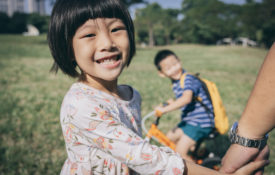-

New Research in Psychological Science
A sample of research on saliency effects in visual working memory, collective action and radicalization, retrospective assessment of quality of parenting, body ownership and motor functioning in stroke patients, age-related changes in spatial navigation, jealousy in dogs, trust and academic cheating, and aging and prosocial motivation. Visit Page
-

Back Page: Environment and Disinhibition
Arielle Baskin-Sommers explores the cognitive-affective processes associated with disinhibition and community violence. Visit Page
-

“Stranger Danger”: Children’s Distrust of Men May Outweigh Information Accuracy
Preschoolers are still learning to consider information accuracy when making judgements of trustworthiness. Visit Page
-

New Research in Psychological Science
A sample of research on children’s susceptibility to trust strangers, prosocial behaviors in adolescents, temporal structure in memory, memory accuracy for real-world events, effort and pupillometric investigation, personality changes and career, and a neurobiological examination of delayed judgments of learning. Visit Page
-
Distrust Authorities, Including Me
Like many teachers, I’ve agonized over what to tell my students about the crises convulsing us lately, the pandemic and U.S. presidential election. What lessons can we draw from what’s happened? I’ve decided to double Visit Page
-

“Stranger Danger”: Children’s Distrust of Men May Outweigh Information Accuracy
Preschoolers are still learning to consider information accuracy when making judgements of trustworthiness. Visit Page

